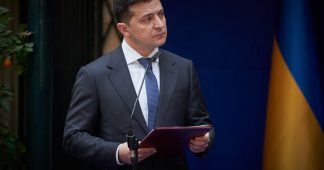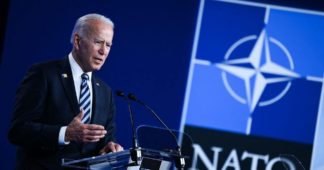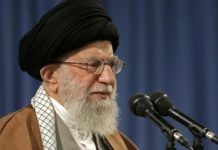Posted on
US President Joe Biden and Ukrainian President Volodymyr Zelensky speak often on the phone. But on a phone call in June, the conversation went very differently.
Biden told Zelensky that he had just authorized $1 billion for more military assistance. Instead of thanking Biden, Zelensky complained about what he wasn’t getting and began listing the additional help he needed. Biden, reportedly, “lost his temper.” “Raising his voice,” Biden told Zelensky to “show a little more gratitude.”
There has been much reporting of “Ukraine fatigue” and of concerns about limitless supply of weapons to Ukraine, but this was the first report of tension in the relationship between Biden and Zelensky.
Administration officials told NBC that “Biden and Zelensky’s relationship has only improved since the June phone call.”
But that may not be entirely true. Two months later, Thomas Friedman reported in The New York Times that “privately, U.S. officials are a lot more concerned about Ukraine’s leadership than they are letting on.” As for Biden’s relationship with Zelensky, in particular, Friedman added that “There is deep mistrust between the White House and President Volodymyr Zelensky of Ukraine — considerably more than has been reported.”
As for the trust, in general, between Washington and Kiev, Friedman reports an erosion: “It is as if we don’t want to look too closely under the hood in Kyiv for fear of what corruption or antics we might see, when we have invested so much there.”
There had been hints about that frustration and lack of trust. After long forcing Zelensky not to negotiate with Russia, more than the tone has changed, and the Biden administration has begun pushing Zelensky to negotiate with Russia. There has been frustration with Zelensky’s effective refusal to negotiate. National Security Advisor Jake Sullivan has pointed out to Zelensky that “Ukraine’s leverage would be strengthened — not weakened — if it expressed openness to ultimately negotiating with the Russians.” The message is that the perception would be better if it was not Ukraine that was seen to be intransigent and if it was Ukraine, and not Russia, that was seen as wanting to negotiate an end to the war.
The lack of trust has been deepened by Ukraine’s response to the missile that landed in Poland, killing two people, on November 15. After it was first reported that a Russian missile had struck inside Poland, raising fears that Article five could be triggered, dragging the US and its NATO partners into the war, it was quickly realized that, though it was a Russian missile, the missile was not fired by Russia. It was an old-style Russian S-300 rocket that the Ukrainian military still possesses. Ukrainian air defense had fired the missile at an incoming Russian missile. The Ukrainian missile missed its target and landed across the border in Poland.
NATO, the US and Poland all accepted this account in harmony. Ukraine, alone, did not. “I have no doubt that it was not our missile or our missile strike,” Zelensky was still saying the next day. Ukrainian Foreign Minister Dmytro Kuleba called the explanation a “conspiracy theory” promoted by Russia. Zelensky provocatively called the missile strike a “Russian attack on collective security in the Euro-Atlantic,” alluding to Article five. He called it “a significant escalation.”
Hearing those words, and the implication they bring with them, the distrust was again triggered, leading Sullivan to quickly call Zelensky’s office and urge “officials to tread more carefully with how they were speaking about the incident.” The relationship was also again in question as Biden seems to have spurned Zelensky’s attempts to arrange a phone call. By late the next day, though Biden had spoken to the Polish president and the NATO Secretary General, he had still not accepted Zelensky’s request to talk.
Zelensky could have accepted the unanimous finding. Samantha de Bendern, associate fellow of Chatham House covering Russia, said that the “denial is surprising. We have come to expect a much more sophisticated media response from the president… He needed to admit the mistake and apologise.”
Zelensky’s stubborn insistence that Russia had launched a missile strike on a NATO country has shaken the West’s trust in him. “This is getting ridiculous,” one NATO country’s diplomat in Kiev told the Financial Times. “The Ukrainians are destroying [our] confidence in them. Nobody is blaming Ukraine and they are openly lying. This is more destructive than the missile.”
Is it destructive enough to shake Washington’s trust in Zelensky? Five days after the missile strike, former Australian ambassador to Poland and Cambodia Tony Kevin claimed that “There were unmistakeable signs this week of growing Western war-weariness and irritation with Zelensky’s endless demands for more weapons and money.” Then, echoing and amplifying Thomas Friedman’s report that “privately, U.S. officials are a lot more concerned about Ukraine’s leadership than they are letting on,” Kevin added that “There is growing speculation that Zelensky’s position as leader may be weakening. Washington may be considering replacing him, but it remains very unclear how and to what end.”
Kevin’s claim is surprising. It is unexplained and unsourced and does not seem to be corroborated by other reporting. On its own, it needs to be taken very cautiously. However, Kevin is a very respected and well-informed diplomat.
There is also room for the Biden administration to distrust people other than Zelensky. There is room for the Biden administration to distrust hawkish elements within its own house who may want to push back against the new push for diplomacy. The one line report that first raised the alarm by reporting that “Russian missiles crossed into NATO member Poland, killing two people” was sourced to “A senior U.S. intelligence official.” It was someone in US intelligence who either irresponsibly or deceptively attributed the missile attack on a NATO member to Russia.
There is also a flipside to Biden being angry with Zelensky for his endless demands for weapons. In the first months of the war, including the April talks in Istanbul, it was the US that stopped Zelensky from negotiating an end to the war with Russia and pushed Ukraine on to fight for US core interests against the Russian superpower. It is not surprising, short of weapons that could strike inside Russia or draw the US into the war, that Zelensky would resent being sent into that fight without the weapons to survive it.
The seemingly endless nature of the war, the constant demands for more weapons and the need for negotiations may have strained the relationship between Biden and Zelensky. The missile that landed in Poland has deepened the distrust and tested that relationship.
We remind our readers that publication of articles on our site does not mean that we agree with what is written. Our policy is to publish anything which we consider of interest, so as to assist our readers in forming their opinions. Sometimes we even publish articles with which we totally disagree, since we believe it is important for our readers to be informed on as wide a spectrum of views as possible.











